英语中的连读现象(非常好)
英语发音连读失去爆破重读弱读英语中常见的发音规则及现象入门必备

英语发音连读失去爆破重读弱读英语中常见的发音规则及现象入门必备英语发音中的连读、爆破、重读和弱读是非常重要的一些规则和现象。
了解这些规则和现象可以帮助我们更清晰地理解和发音英语。
以下是一些关于这些规则和现象的入门必备知识。
连读(Liaison)连读是指在英语连续的音节之间,辅音和元音之间的连接。
这个现象使得英语的发音更流畅,并且能够帮助我们更好地识别和理解一些单词和短语。
以下是一些常见的连读规则:1. 辅音+辅音:当一个单词以辅音结尾,下一个单词以辅音开头时,这两个辅音会连读。
例如,“good day”连读成[gud deɪ]。
2. 元音+元音:当一个单词以元音结尾,下一个单词以元音开头时,两个元音会连读。
例如,“see it”连读成[si ɪt]。
3. 元音+辅音:当一个单词以元音结尾,下一个单词以辅音开头时,两个单词之间通常用连音符连接。
例如,“a dog”连读成[eɪ.dɒɡ]。
爆破(Aspiration)爆破是指在一些情况下,当辅音出现在一个重读的音节开头时,它们会带有气流的爆破音效。
以下是一些常见的爆破规则:1. 发/p/音:在一个重读的单词开头或音节开头,/p/音通常会带有更强烈的气流爆破效果。
例如,“pat” 发音为“pæt”。
2. 发/t/音:在一个重读的单词开头或音节开头,/t/音通常会带有更强烈的气流爆破效果。
例如,“top” 发音为“tɒp”。
3. 发/k/音:在一个重读的单词开头或音节开头,/k/音通常会带有更强烈的气流爆破效果。
例如,“cat” 发音为“kæt”。
重读和弱读(Stress and Weak Forms)在英语中,一些词和音节有重音(也称为强读),而其他词和音节则有弱音(也称为弱读)。
以下是一些常见的重读和弱读规则:1. 重读:在一个多音节的单词中,通常有一个音节被重读。
例如,“banana”中的重读音节是第一音节,发音为“bəˈnænə”。
人教版高中英语 连读
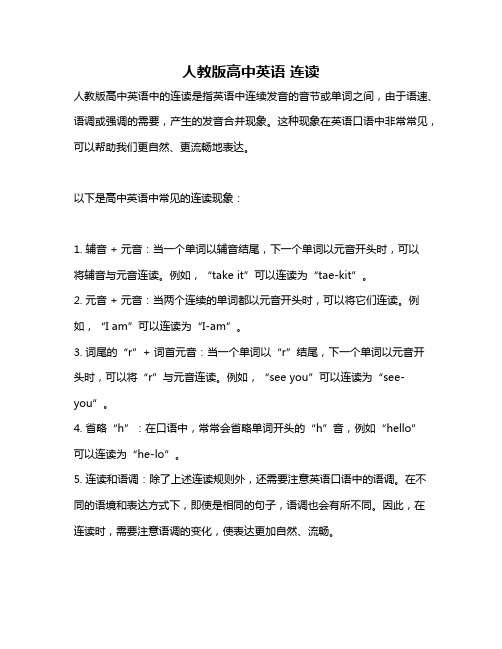
人教版高中英语连读
人教版高中英语中的连读是指英语中连续发音的音节或单词之间,由于语速、语调或强调的需要,产生的发音合并现象。
这种现象在英语口语中非常常见,可以帮助我们更自然、更流畅地表达。
以下是高中英语中常见的连读现象:
1. 辅音 + 元音:当一个单词以辅音结尾,下一个单词以元音开头时,可以
将辅音与元音连读。
例如,“take it”可以连读为“tae-kit”。
2. 元音 + 元音:当两个连续的单词都以元音开头时,可以将它们连读。
例如,“I am”可以连读为“I-am”。
3. 词尾的“r”+ 词首元音:当一个单词以“r”结尾,下一个单词以元音开头时,可以将“r”与元音连读。
例如,“see you”可以连读为“see-you”。
4. 省略“h”:在口语中,常常会省略单词开头的“h”音,例如“hello”
可以连读为“he-lo”。
5. 连读和语调:除了上述连读规则外,还需要注意英语口语中的语调。
在不同的语境和表达方式下,即使是相同的句子,语调也会有所不同。
因此,在连读时,需要注意语调的变化,使表达更加自然、流畅。
总之,掌握高中英语中的连读规则可以帮助我们更好地掌握英语口语的发音技巧,提高英语口语的流利度和自然度。
同时,还需要注意英语口语中的语调和节奏,使表达更加地道、准确。
史上最全的英语连读规则一网打尽
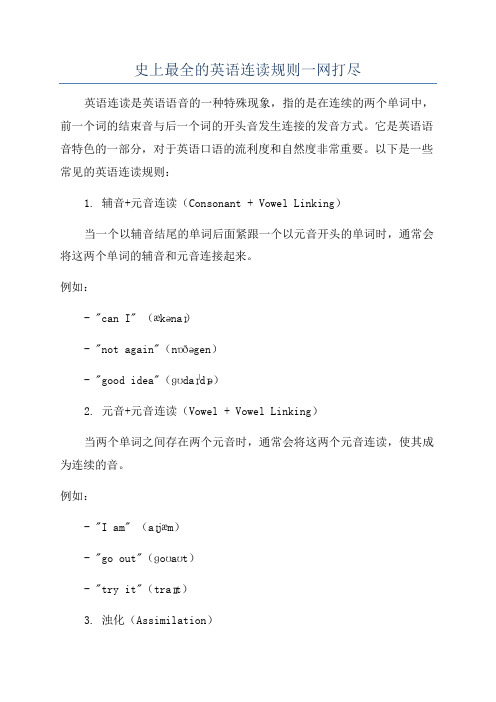
史上最全的英语连读规则一网打尽英语连读是英语语音的一种特殊现象,指的是在连续的两个单词中,前一个词的结束音与后一个词的开头音发生连接的发音方式。
它是英语语音特色的一部分,对于英语口语的流利度和自然度非常重要。
以下是一些常见的英语连读规则:1. 辅音+元音连读(Consonant + Vowel Linking)当一个以辅音结尾的单词后面紧跟一个以元音开头的单词时,通常会将这两个单词的辅音和元音连接起来。
例如:- "can I" (ækənaɪ)- "not again"(nɒðəgen)- "good idea"(ɡʊdaɪˈdɪə)2. 元音+元音连读(Vowel + Vowel Linking)当两个单词之间存在两个元音时,通常会将这两个元音连读,使其成为连续的音。
例如:- "I am" (aɪjæm)- "go out"(ɡoʊaʊt)- "try it"(traɪɪt)3. 浊化(Assimilation)当一个以清辅音结尾的单词后面紧跟一个以辅音开头的单词时,清辅音(如/p/,/t/,/k/等)通常会变成其相应的浊辅音(如/b/,/d/,/ɡ/等)。
例如:- "cup of tea"(kʌbəvˈtiː)- "that guy"(ðæɡaɪ)- "big dog"(bɪdoɡ)4. 借音(Epenthesis)当一个以元音结尾的单词后面紧跟一个以辅音开头的单词时,在这两个单词之间通常会插入一个短促的/i/音(schwa)。
例如:- "crazy idea"(kreɪziˈaɪdiə)- "my old"(maɪoʊld)5. 弱元音免略(Weak Vowel Deletion)在一些情况下,一个单词中的弱元音(如/i/,/ə/)可能会被省略掉,使得两个单词的发音更加流畅。
英语口语中的连读、失去爆破等技巧
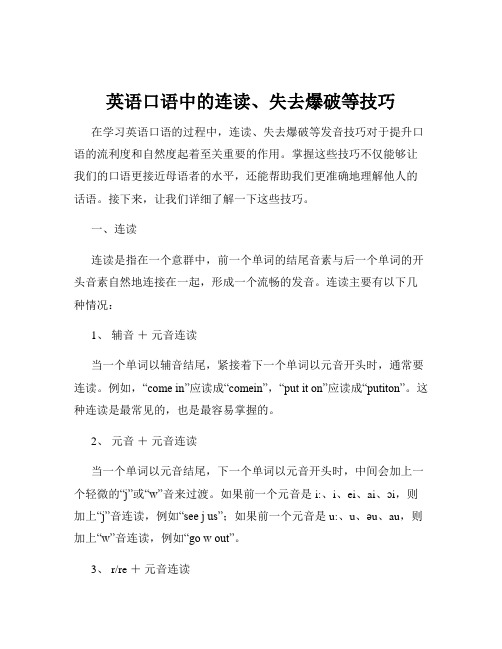
英语口语中的连读、失去爆破等技巧在学习英语口语的过程中,连读、失去爆破等发音技巧对于提升口语的流利度和自然度起着至关重要的作用。
掌握这些技巧不仅能够让我们的口语更接近母语者的水平,还能帮助我们更准确地理解他人的话语。
接下来,让我们详细了解一下这些技巧。
一、连读连读是指在一个意群中,前一个单词的结尾音素与后一个单词的开头音素自然地连接在一起,形成一个流畅的发音。
连读主要有以下几种情况:1、辅音+元音连读当一个单词以辅音结尾,紧接着下一个单词以元音开头时,通常要连读。
例如,“come in”应读成“comein”,“put it on”应读成“putiton”。
这种连读是最常见的,也是最容易掌握的。
2、元音+元音连读当一个单词以元音结尾,下一个单词以元音开头时,中间会加上一个轻微的“j”或“w”音来过渡。
如果前一个元音是i:、i、ei、ai、ɔi,则加上“j”音连读,例如“see j us”;如果前一个元音是u:、u、əu、au,则加上“w”音连读,例如“go w out”。
3、 r/re +元音连读如果单词以 r 或 re 结尾,后接一个以元音开头的单词,此时 r 要发音,并与后面的元音连读。
例如,“for ever”应读成“forever”,“here and there”应读成“hereandthere”。
连读的好处在于能够使句子的发音更加流畅,减少停顿,增强语言的节奏感。
但需要注意的是,连读并不是随意的,而是要根据单词的发音和句子的语境来决定。
二、失去爆破失去爆破是指在某些情况下,爆破音(/p/、/b/、/t/、/d/、/k/、/g/)在发音时只做出发音的准备,但不爆破出来,稍作停顿后直接发出后面的音。
失去爆破主要有以下几种情况:1、爆破音+爆破音当两个爆破音相邻时,前一个爆破音失去爆破。
例如,“big cake”中,“big”的“g”失去爆破,只读“bi_ cake”;“stop talking”中,“stop”的“p”失去爆破,只读“sto_ talking”。
英语发音中的连读和加音现象
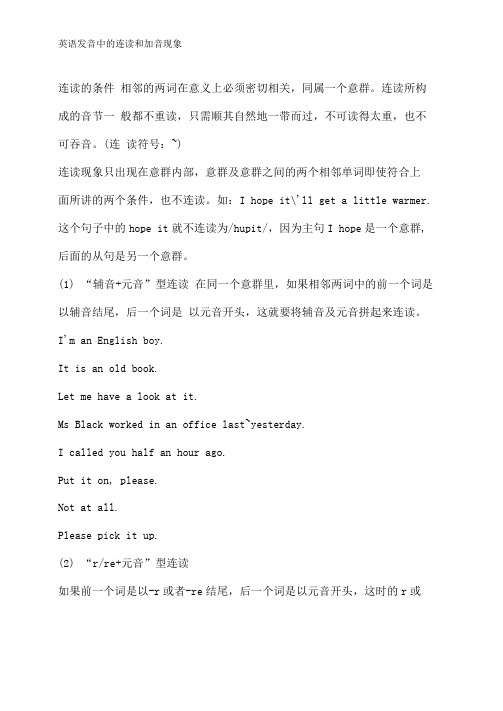
英语发音中的连读和加音现象连读的条件相邻的两词在意义上必须密切相关,同属一个意群。
连读所构成的音节一般都不重读,只需顺其自然地一带而过,不可读得太重,也不可吞音。
(连读符号:~)连读现象只出现在意群内部,意群及意群之间的两个相邻单词即使符合上面所讲的两个条件,也不连读。
如:I hope it\'ll get a little warmer. 这个句子中的hope it就不连读为/hupit/,因为主句I hope是一个意群, 后面的从句是另一个意群。
(1)“辅音+元音”型连读在同一个意群里,如果相邻两词中的前一个词是以辅音结尾,后一个词是以元音开头,这就要将辅音及元音拼起来连读。
I'm an English boy.It is an old book.Let me have a look at it.Ms Black worked in an office last~yesterday.I called you half an hour ago.Put it on, please.Not at all.Please pick it up.(2)“r/re+元音”型连读如果前一个词是以-r或者-re结尾,后一个词是以元音开头,这时的r或re不但要发/r/,而且还要及后面的元音拼起来连读。
有两种,一种是前一个单词最后一个字母为r,另一种是最后一个字母不为r,r 例如 the idea~ ofOver and over again r 伦 r reShe is going to major in English.IS your hometown far away?Don't go out after eight.There are nine all together.They're new to the work after all.Where are you staying?Peter isn't here yet.It's going to clear up soon.Both my father and mother are coming tonight.They've been there for an hour.The author is going to give a talk.Did you see the car at the door?Was Susanna in last night?This is Beta Engineering.Give me an example of Formula A.注意:如果一个音节的前后都有字母r,即使后面的词以元- 能连读。
英语中的连读等现象
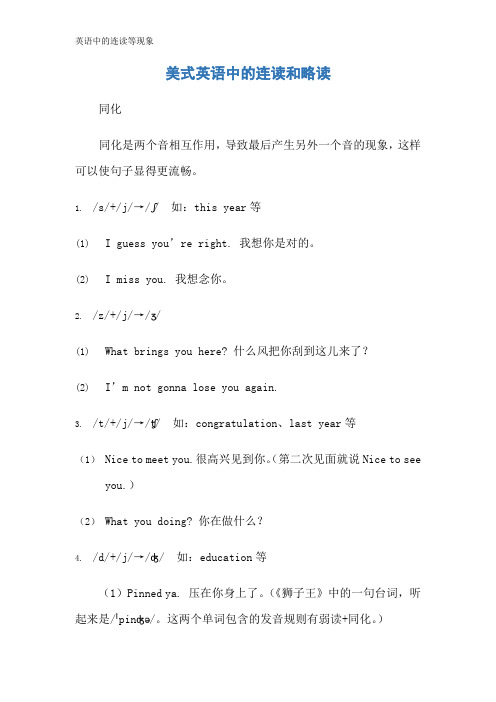
美式英语中的连读和略读同化同化是两个音相互作用,导致最后产生另外一个音的现象,这样可以使句子显得更流畅。
1./s/+/j/→/ʃ/ 如:this year等(1)I guess you’re right. 我想你是对的。
(2)I miss you. 我想念你。
2./z/+/j/→/ʒ/(1)What brings you here? 什么风把你刮到这儿来了?(2)I’m not gonna lose you again.3./t/+/j/→/ʧ/ 如:congratulation、last year等(1)Nice to meet you.很高兴见到你。
(第二次见面就说Nice to see you.)(2)What you doing? 你在做什么?4./d/+/j/→/ʤ/ 如:education等(1)Pinned ya. 压在你身上了。
(《狮子王》中的一句台词,听起来是/ˈpinʤə/。
这两个单词包含的发音规则有弱读+同化。
)(2)How did you like it? 你觉得怎样?连读在正常英语口语中,连读现象比比皆是。
有些较短的句子听起来简直就像一个单词,所以学好连读是通向流利英语必经之路。
1.词尾辅音+词首元音这种连读最常见也最简单,把相邻的两个单词想象成一个单词即可。
(1)I’m so fed up with him. 他让我烦透了。
(2)I’ve already made up my mind. 我意已决。
(3)That is so gross [ɡrəus].太俗了。
(4)Turn on the juice. 合上开关,恢复通电。
(juice也有电的意思)2.词尾元音+词首元音A:以/u/、/ʊ/、/au/、/o/结尾的单词与跟在后面的元音连读时,两个元音之间加上一个较轻的/w/,这样过渡就会很自然。
(1)Just do it. 尽管去做吧!(2)It’s snowing. 下雪了。
高中英语听力中的连读现象分析

高中英语听力中的连读现象分析在高中英语学习中,听力往往是让许多同学感到头疼的部分。
其中,连读现象是影响听力理解的一个重要因素。
连读现象在英语日常交流中十分常见,如果不能准确把握,很容易造成理解上的偏差和障碍。
一、连读的定义和类型连读,简单来说,就是在一个意群中,前一个单词的结尾音与后一个单词的开头音相连,从而形成一种流畅、自然的发音方式。
连读主要有以下几种类型:1、辅音+元音连读当一个单词以辅音结尾,而下一个单词以元音开头时,通常会发生连读。
例如,“put it”会连读成“pu(t) it”,“stand up”连读为“stan(d) up”。
这种连读是最为常见的类型,在听力中出现的频率极高。
2、元音+元音连读当前一个单词以元音结尾,后一个单词以元音开头时,也会产生连读。
这又可以分为两种情况:(1)如果前一个元音是长元音或双元音,后一个元音是短元音,则在两个元音之间加上一个轻微的j音进行连读。
比如,“go away”连读成“go(w) away”。
(2)如果前一个元音是短元音,后一个元音是长元音或双元音,则在两个元音之间加上一个轻微的w音进行连读。
例如,“how are”连读为“how(w) are”。
3、辅音+辅音连读这种连读相对较少见,但也存在。
当两个单词相邻的辅音相同或相似时,通常只读一个辅音。
比如,“big game”连读为“bi(g) game”。
二、连读产生的原因连读现象的产生并非偶然,而是有其语言发展和交流的内在原因。
1、提高语言表达的流畅性连读可以使句子的发音更加连贯、自然,减少停顿和中断,从而提高语言表达的效率和流畅性。
2、遵循发音规则和习惯英语的发音规则和习惯决定了在特定的情况下会发生连读。
经过长期的语言使用和演变,这些规则逐渐被固定下来。
3、适应语速和节奏在日常交流中,为了跟上思维的速度和表达的节奏,人们会自然而然地采用连读的方式,使语言更加紧凑。
三、连读对高中英语听力的影响连读现象给高中英语听力带来了多方面的影响。
英语中的连读失爆缩读同化浊化等

英语中的连读失爆缩读同化浊化等英语中的连读、失爆、缩读、同化、浊化等连读、失爆、缩读、同化和浊化是英语发音中的一些特征,它们在口语交流中起到重要的作用。
本文将逐一介绍这些特征,并且探讨它们对于英语交流的影响。
一、连读(Linking)连读是指一个单词的尾音与下一个单词的首音之间发生连续流畅的连接,以便提高句子的语音连贯性。
在英语中,当一个单词以辅音结尾,下一个单词以元音开头时,通常会发生连读现象。
例如,当我们说"I have"时,单词"have"结尾的/v/音和下一个单词"an"开头的元音音素/a/会连读在一起,变成/əv/的发音,即"əv ən"。
同样,当我们说"can you"时,单词"can"的/n/音和下一个单词"you"的/y/音连读在一起,变成/nyu:/的发音,即"nyu: kæn ju:"。
连读的使用可以使语音更加流畅,让交流更加自然。
但需要注意的是,连读并不是一种必须遵守的规则,而是一种口语化的现象,在正式场合或慢速阅读时并不常见。
二、失爆(Plosion)失爆是指在英语的发音中,一些辅音音素在特定位置上发音时,爆破音(p、t、k)的发声被轻微或完全省略,变成浊化音(b、d、ɡ)。
例如,当我们说"please"和"stop"时,单词末尾的/p/和/t/的爆破音会被省略,变成/iz/和/ɑp/的发音,即"pli:z"和"stɑp"。
失爆可以使发音更加快捷,加快语言交流速度。
然而,在某些情况下,省略爆破音可能会造成词义的误解,因此在正式场合或需要强调的语境下,需要更加准确地发音。
三、缩读(Elision)缩读是指在英语的发音中,一些辅音音素在特定位置上发音时,部分音素被省略或压缩,从而缩短单词的发音长度。
英语连读技巧和规律(精选3篇)整理

英语连读技巧和规律(精选3篇)整理英语连读技巧和规律(精选3篇)英语连读是英语口语和英语听力最重要的门槛之一,了解其中的技巧对学习英语有特别重要的意义,下面我给大家共享英语连读技巧和规律,盼望能够关心大家!英语连读技巧和规律(篇1)连读中辅音+元音,这个是大家比较广知的连读技巧。
即前一个单词的末读音是辅音,后一个单词的首读音是元音,这两个单词要连读。
比如his name is ,就可以读成his namis。
比如take up就可以读成takup。
先帮大家复习个学问,以备后用,英语中清辅音与浊辅音往往存在着对应关系。
t-d,ch-j,s-z,sh-zh,p-b,f-v,k-g,对应的清辅音和浊辅音发音位置往往是基本相像的。
连读中辅音+辅音,在知道上述学问后,我们可以了解一个技巧,假如前一个单词的末读音和后一个单词的首读音是对应的清辅音和浊辅音,那么这两个单词要连读,并且发浊辅音,比如it do可以读成ido。
连读中元音加元音之一,前一个单词末读音是元音,后一个单词首读音是元音,一种是中间是插入一个特别轻的w,比如go anytime ,就可以连读成gowanytime,但留意w是特别轻的连读中元音加元音之二,前一个单词末读音是元音,后一个单词首读音是元音,一种是中间是插入一个特别轻的y,比如i ask,就可以连读成iyask,同样y是特别轻的。
中间是插y还是w,在详细的句子当中,你可以很简单体会出来,比如你在go anytime中间加y就会特别拗口。
英语连读技巧和规律(篇2)关键词捕风捉影所谓语言,是人们沟通的必要工具,而语言是通过什么来实现沟通传输信息呢?显而易见——语句。
一个句子再简单,它也可以分解成很多基础结构,这些结构总是相互紧密联系的,所以,在英语的单项选择中,对于关键词的捕获是必需学会的,对于语法结构的分析必不行少。
品尝对话语境“语境”供应交际信息,关心交际者正确理解交际内容,从而运用语法组词造句并作出恰当的反应,以达到交际的目的。
非常好的英语口语连读技巧
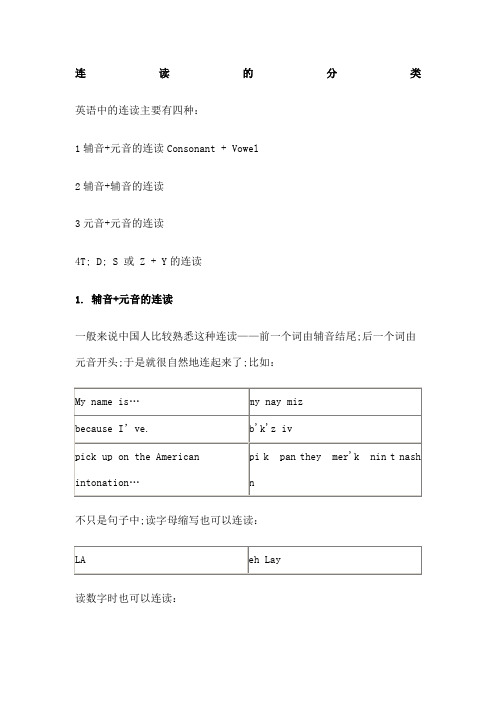
连读的分类英语中的连读主要有四种:
1辅音+元音的连读Consonant + Vowel
2辅音+辅音的连读
3元音+元音的连读
4T; D; S 或 Z + Y的连读
1. 辅音+元音的连读
一般来说中国人比较熟悉这种连读——前一个词由辅音结尾;后一个词由元音开头;于是就很自然地连起来了;比如:
不只是句子中;读字母缩写也可以连读:
读数字时也可以连读:
再来几个简单例子:
因为这种连读一般初中生都会;在这里就不详细介绍了;重头戏在后面;马上开演..
2. 辅音+辅音的连读
这个很难用文字描述;放到最后再讲..
3. 元音+元音的连读
如果前一个词是由元音u结尾;下一个词由元音开头;那么;在u后面加上一个辅音w
如果前一个词是由元音i结尾;下一个词由元音开头;那么;在i后面加上一个辅音y
只说规则似乎有点不好理解;看例子就明白了..
在电影Big Fish中;巨人Carl说过这句话..因为巨人说话又慢又重;所以那个w很明显..
再来看一个例子:
这种连读不能把辅音w或者j发得太重;否则会显得很傻;但是不发这两个辅音的话又会很难念得顺口..
4. T; D; S 或 Z + Y的连读
如果前面的单词是以T/D/S/Z结尾;后面的单词是以Y开头一般是you这个词;那么有如下的连读规则可以使用..
4.1. T + Y = CH
4.2. D + Y = J
4.3. S + Y = SH
4.4. Z + Y = ZH
附录: 音节省略和连读放在一起。
英语常见的连音

英语常见的连音英语中的连音是指音节之间连续发出的声音,使得单词在快速连读时能够更加流利地发音。
连音在英语中非常常见,特别是在口语中。
下面是一些常见的连音及其使用示例:1. 连读(Linking)连读是指当一个单词以元音结尾,后面的单词以辅音开始时,通常把这两个单词的辅音连在一起,形成一个连读音。
例如:- I saw it. (我看见了它。
)- He is English. (他是英国人。
)2. 省略(Elision)省略是指在连读时省略部分音节或辅音的现象。
例如:- Gonna (going to的缩写,表示将要做某事。
)- Wanna (want to的缩写,表示想要做某事。
)- Lemme (let me的缩写,表示让我做某事。
)3. 连读辅音(Consonant Clusters)连读辅音是指在连读中,两个音节之间发音连贯,辅音同时出现。
例如:- Next class (下一节课)- Best friend (最好的朋友)4. 连读元音(Vowel Glides)连读元音是指在连接两个元音时,使用一个辅音使它们之间的转折更加平滑。
例如:- Go out (外出)- Dry ice (干冰)5. 弱读音(Schwa)弱读音是指在非重读音节中,元音的发音变为中央元音/ə/。
例如:- 'Friend (朋友)- 'Computer (计算机)6. 连读数量词(Linking with Numbers)在英语中,数字和名词之间通常连读,例如:- Five apples (五个苹果)- Nine people (九个人)7. 统一连读(Homogenization)在句子中相邻的单词,如果它们都以辅音或元音结束或开始,为了发音方便,辅音或元音的发音可能会更趋相似,从而形成统一连读。
例如:- That dog (那只狗)- Her umbrella (她的雨伞)8. 连读双元音(Diphthong Linking)当一个单词以一个双元音结尾时,后面的单词以元音开始,双元音可以作为一个整体连读。
25个连读方法

25个连读方法连读是指将相邻的两个或多个单词连接在一起,以流畅地快速发音。
它在英语口语中非常常见,可以使句子更加自然地流畅。
在英语中,有很多种连读方法可以使用,下面将介绍25个常见的连读方法。
1. 链式连读(Linking):当一个以辅音字母结尾的词紧跟着一个以元音字母开头的词时,将辅音字母的音加在元音字母的前面,如"go over"连读为"go-veral"2. 消失连读(Elision):当一个词以辅音音素结尾且紧跟着一个以元音音素开头的词时,辅音音素会消失,如"I am"连读为"I'm"3. 复合连读(Compound):在某些习惯用语和固定短语中,将相邻的两个词连读在一起,如"kind of"连读为"kinda"4. 省略连读(Omission):在某些特殊情况下,可以省略某些字母或音节,以使发音更加流畅,如"going to"连读为"gonna"5. 弱化连读(Weak Form):在某些语法辅助词和冠词中,原本重读的音节会变得弱化,如"to the"连读为"tuh"6. 浊化连读(Assimilation):当一个词以清辅音开始,下一个以浊辅音开始时,清辅音会变为浊辅音,如"good boy"连读为"goo-boy"7. 浊辅音消化连读(Flapping):当一个以清辅音结尾的发音跟着一个重读的音节,清辅音/t/会变为音节/tʰ/,如"better idea"连读为"be(tʰ)er idea"8. 连续浊音连读(Flap T):当词中的/t/和/d/音跟着一个/i/时,/t/和/d/会连读为/flæp t/音,如"city hall"连读为"ci(flæp t)i hall"9. 唇齿音连读(Lips):当一个以闭音节结束的发音跟着一个以直接连音结束的发音时,闭音节会变为唇齿音,如"big apple"连读为"bi(gə)pple"10. 喇叭音连读(Flare):当两个相同的元音音素紧跟着一个辅音音素时,第一个元音会变为喇叭音,如"green apple"连读为"gree(næ)pple"11. 回声连读(Echo):在某些情况下,重复发音一个音节,以使发音更加流畅,如"cup of coffee"连读为"cu(pə)p of coffee"12. 对位连读(Corresponding):在复合词中,辅音音素相似的部分会彼此影响和融合,如"handbag"连读为"ham(bæ)g"13. 双元音连读(Double Vowels):连续的两个元音音素会合并成一个音节,如"coin"连读为"coi(nə)"14. 不规则省略连读(Irregular Omission):在某些词和短语中,会发生不规则的省略连读现象,如"library"连读为"libry"15. 大小写连读(Capitalization):在某些情况下,首字母大小写的差异会影响连读现象,如"new York"连读为"ne w York"16. 同音异形连读(Homograph):在某些同音异形词汇中,会发生不同的连读现象,如"used car"连读为"yoo-car"17. 母音音位连读(Vowel Phoneme):在某些情况下,母音音素的差异会影响连读现象,如"I like"连读为"I-lik"18. 方言连读(Dialectal):不同地区的英语方言会有不同的连读现象,如美国英语和英式英语之间的连读差异19. 速度连读(Speed):当说话速度很快时,连读现象会更加明显,如快速说出"it is"连读为"i(h)t-z"20. 习惯连读(Habitual):在习惯用语和固定表达中,连读现象会更加普遍和自然,如"should have"连读为"should-'ve"21. 类似音连读(Similar Sounds):相邻的两个音素音是否相似也会影响连读现象的发生,如"thin knife"连读为"thi(næ)if"22. 薄弱连读(Weak Linking):在连读中,某些辅音音素会变得很弱并且几乎听不见,如"at times"连读为"a-(t)times"23. 介音连读(Intervocalic):当两个元音音素之间跟着一个辅音音素时,两个元音会连读在一起,如"coastline"连读为"coas(t)line"24. 辅音音位连读(Consonant Phoneme):在某些情况下,辅音音素的差异会影响连读现象,如"best friend"连读为"be(z)d friend"25. 近似连读(Approximate):在连读中,某些音素会以近似的音进行连读,如"that apple"连读为"tha(t)apple"这些连读方法在英语口语中被广泛应用,而且非常常见。
英语中的连读现象(非常好)_2022年学习资料
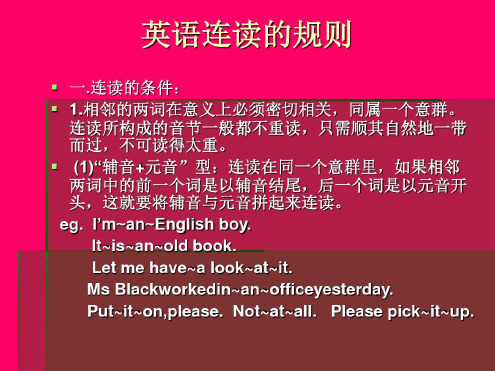
■3.“辅音+半元音”型连读-英语语音中的/和/w/是半元音,如果前一个词-是以辅音结尾,后一个词是以半元 ,特别是-开头,此时也要连读。-eg.Thank~you.-Nice to meet~you.-Did~y u get there late~again?-Would~you like~a cup~of tea?ould~you help me,please?-音的同化”一常把/d/+lj/读成/dVI,did yo 听-上成了/dldVu/,would you成了wudVu/,-could you成了kudVu/。
三.浊化-1、[S]后面的清辅音要浊化-eg.discussion:K浊化成[g]-stand:[浊化成[ -expression:[p]浊化成[bl-美音中:[在单词的中间被浊化成[d-如:-writer,听起来 rider的发音几乎没有区别-letter-ladder-美国人和加拿大人发音为了省事,习惯清音浊化,-尤 是t]在单词的中间一定会浊化成d],但英-国人发不会这样,这也是英音和美音的一大区-。了解这一浊化原厕,会 听力带来一些帮-助
英语连读的规则-一连读的条件:-1相邻的两词在意义上必须密切相关,同属一个意群。-连读所构成的音节一般都不 读,只需顺其自然地一带-而过,不可读得太重。-1“辅音+元音”型:连读在同一个意群里,如果相邻-两词中的前 个词是以辅音结尾,后一个词是以元音开-头,这就要将辅音与元音拼起来连读。-eg.I'm-an-Englis boy.-It~is~an~old book.-Let me have~a look~at~it.-Ms Blackworkedin~an~officeyesterday.-Put~it~on,please.No ~at~all.Please pick~it~up
中考英语听力、口语中的连读现象

听力
听写歌词
There's a girl but I let her get away. It's all my fault cause pride got in the way. And I'd be lying if I said I was OK. About that girl the one I let get away.
听力
连读
常见的几种英语连读现象: 3.元音+元音 以/u:/或/ʊ/结尾(双元音/aʊ/、/əʊ/也是以短元音/ʊ/结 尾)+元音连读时,用/w/连接 who⌒else /hu:wels/ go⌒in /gəʊwɪn/ no⌒other /nəʊwʌðə/ How⌒are you? /haʊwɑː/
听力
连读
常见的几种英语连读现象:
4.辅音+辅音(失去爆破,前面的辅音不读或弱读)
6个爆破音/p/、/b/、/t/、/d/、/k/、/g/中,任意两个相
邻,前一个爆破音会失去爆破,前面的辅音不读或弱读)
best⌒time /bes(t)taɪm/ sit⌒down /sɪ(t)daʊn/
a big⌒cake /bɪ(g)keɪk/ keep⌒busy /ki:(p)bɪzɪ/
听力
曾经心爱的女孩 我却让她擦肩而过 自尊心作祟 一切都是我的错 若说无事 其实只是谎言未戳破 那个女孩 我们曾擦肩而过
原来是 连读 啊!!!
听力
连读
常见的几种英语连读现象: 1.辅音+元音 an⌒apple /ənæ pl/ stand⌒up /stæ ndʌp/ in⌒an⌒hour /ɪnənaʊə/ look⌒at,pick⌒up, put⌒on a friend⌒of mine
生活场景中的英语连读现象

在日常生活场景中,英语连读现象是非常常见的。
以下是一些例子:
1.“r”和后面的元音连读:在美式英语中,当“r”音后跟着一个元音时,往往会有连读
现象。
例如,“for you”会被连读成“for-yu”。
2.“t”和“d”与后面的元音连读:在美式英语中,当“t”或“d”音后跟着一个元音时,这两
个音通常会与后面的元音连读。
例如,“water bottle”会被连读成“wota-ber”。
3.省略辅音:在快速说话或非正式场合中,人们往往会省略一些辅音,尤其是那些不
易发音的辅音。
例如,“that is”可能会被说成“dat iz”。
4.“h”的弱化:在非正式场合中,“h”音往往会被弱化,尤其是在一些非重读音节中。
例如,“hello”可能会被说成“aleo”。
5.元音的弱化:在快速说话或非正式场合中,一些元音可能会被弱化或省略。
例如,
“about”可能会被说成“abaut”。
6.儿化音的运用:在口语中,儿化音是一种常见的现象。
例如,“car”可能会被说成
“carr”。
7.声调的起伏:在口语中,英语单词的声调会有所起伏,以表达不同的情绪或强调某
些信息。
例如,“I am”和“I'm”在语气上可能会有所不同。
以上只是一些常见的例子,实际上英语连读现象还有很多变化和例外。
但总的来说,掌握好这些连读规则可以帮助你更好地理解和说英语。
英语中的发音规则连读同化失音浊化弱读

英语中的发音规则连读同化失音浊化弱读1. 连读 (Linking): 在英语中,词与词之间通常会发生连读。
当一个词以辅音结尾而下一个词以元音开始时,两个词的边界会被抹去,辅音会连到下一个词的开头。
例如,"I am" [aɪæm] 可以连读成 [aɪm],"you are" [juːɑːɹ] 可以连读成 [juːɑː].2. 同化 (Assimilation): 同化是指一些音素相互影响,以使发音更加流畅,或是使音素更易于发音。
例如,在连续发音中,辅音音素的发音可能会受到相邻音素的影响而发生变化。
例如,"in the bag" 中的 "n"在发音时会受到前面的 "m" 的影响,发音更接近 /m/。
3. 失音 (Elision): 失音是指发音过程中省去一些音素或音节的现象。
例如,有些元音可能在发音中被省略或减弱。
例如,"I have" 可以发音为 [aɪv],其中的 "h" 被省略。
4. 浊化 (Voicing): 在英语中,有些辅音的发音会受到相邻的音素的影响而发生浊化现象。
浊化是指辅音中的清辅音变为相应的浊辅音。
例如,"cats" 在发音时,辅音 "t" 会由清辅音 [t] 变为浊辅音 [d]。
5. 弱读 (Schwa): 弱读是指非重读音节中的元音发音变为中央中性元音 [ə] 的现象。
非重读元音在发音中往往减弱,变得不太清晰。
例如,在单词 "banana" 中,重读音节是第二个 "a",而其他两个音节中的 "a" 都会发音为中央中性元音。
除了以上的发音规则,英语中还存在一些特殊情况和例外。
发音规则也会因方言和口音的差异而有所不同。
总的来说,掌握这些发音规则可以帮助学习者更好地理解英语的发音,并提高听力和口语表达的流利程度。
举例说明各种语流音变的现象

举例说明各种语流音变的现象语流音变是人们在说话过程中,由于语流的连续性造成的音的改变。
在不同的语言和方言中,语流音变现象不同。
以下是几种常见的语流音变的现象。
1.连读现象在英语中,一个单词的结尾辅音与下一个单词的开头辅音有连读的现象。
例如,"can't you"发音时,连读成“kæn(t)ju”。
在日语中,两个汉字连读时,音变成一个新的音,称为「促音」。
例如,「きっと」发音时,连读成"kit(to)"。
2.消音现象在普通话中,有些单音节词的声母或韵母在快速说话时会消音。
例如,“儿子”这个词发音时,其中的“r”字母会被省略掉。
在西班牙语中,某些单词的辅音字母会被消音。
例如,“hablo español”(我说西班牙语)发音时,其中的“h”和“b”被省略。
3.模糊音现象在英语中,有些辅音音素在特定环境下发生模糊。
例如,在“water”这个单词中,辅音/t/和/r/在大多数情况下发音清晰,但在后面跟了一个元音时,/t/和/r/的发音会变得模糊,成为/u/的音素,发音成为"waʔ-ər"。
在普通话中,有些音素会在特定情境下发生模糊。
例如,在“nǐ hǎo”这个词语中,第一个音节的/n/和/i/在连读时会发生模糊,发音成为"níhǎo"。
4.进行音和尾音现象在英语中,很多单词的词尾辅音会发生变化,特别是在动词加-ing时。
例如,在“walking”这个单词中,词尾/k/的发音被变成/g/发音,读成/wɔːkɪŋ/。
在法语中,一些名词的末音会被省略掉,例如,“le chocolat”(巧克力)发音时,省略掉了最后的/t/。
综上所述,语流音变是语言不可避免的一个现象。
它可以使说话者的语言更加流畅,但也可能造成语言的不规范和误解。
因此,学习者在学习语言时,需要注意并了解不同语言的语流音变现象,丰富自己的语言技能,避免误解和搞错。
- 1、下载文档前请自行甄别文档内容的完整性,平台不提供额外的编辑、内容补充、找答案等附加服务。
- 2、"仅部分预览"的文档,不可在线预览部分如存在完整性等问题,可反馈申请退款(可完整预览的文档不适用该条件!)。
- 3、如文档侵犯您的权益,请联系客服反馈,我们会尽快为您处理(人工客服工作时间:9:00-18:30)。
▪ 11. While I was waiting for our bus, the rain stopped. ▪ 12. There is only one hospital in the town. ▪ 13. Perhaps that pair of shoes will fit me. ▪ 14. He came in and asked for a cup of coffee. ▪ 15. Here is your bag. ▪ 16. He is standing at the other end of the bridge. ▪ 17. There are no clean glasses in the kitchen, we have
与and不可连读)
▪ 3.“辅音+半元音”型连读 ▪ 英语语音中的/j/和/w/是半元音,如果前一个词
是以辅音结尾,后一个词是以半元音,特别是/j/ 开头,此时也要连读。
▪ eg. Thank~you.
▪ Nice to meet~you.
▪ Did~you get there late~again?
▪ eg. They’re my father~and mother.
▪
I looked for~it here~and there.
▪
There~is a football under~it.
▪
There~are some books on the desk.
▪
Here~is a letter for you.
▪ eg. The girl in the re(d) coat was on a bla(ck) bike jus(t) now. ▪ The bi(g) bus from the fa(c) tory is full of people. ▪ Wha(t) time does he get up every morning? ▪ This is an ol(d) pi(c)ture of a bi(g) car. ▪ The ol(d) do(c)tor has a ca(t), too. ▪ We’re going to work on a farm nex(t) Tuesday. ▪ What would you like, ho(t) tea or bla(ck) coffee? ▪ It’s a very col(d) day, but it’s a goo(d) day. ▪ You can put i(t) down in the bi(g) garden. ▪ I bought a chea(p) book, but it’s a goo(d) book.
▪ 16. tell us a story ▪ 17. find it in my desk ▪ 18. waited and waited ▪ 19. run after it ▪ 20. at the end of the street ▪ 21. here and there ▪ 22. sit at the other end of the room ▪ 23. after a while ▪ 24. take for example ▪ 25. for an hour ▪ 26. a pair of trousers ▪ 27. wait for a student ▪ 28. find the answer after all ▪ 29. put more on her plate ▪ 30. take care of it
▪ 1. I don’t understand the theory at all. ▪ 2. Jane has saved a lot of money. ▪ 3. It isn’t our mistake. ▪ 4. My mother came and opened the door. ▪ 5. Instead of a shirt, Tom bought a jacket. ▪ 6. There was a man and a woman sitting behind me. ▪ 7. I shall graduate from middle school in one and a half
▪ (2)“爆破音+摩擦音”型:如果前面是爆破音,其 后紧跟着某些摩擦音(如/f/,/s/,/W/,/T/等),
那么前面那个爆破音仅有十分轻微的爆破,而 后面那个摩擦音则要完全爆破。
eg. Goo(d) morning, Mr. Bell.
▪
Uncle Li’s fa(c)tory is qui(te) near to the
cinema.
▪
I wen(t) there alone a(t) nine las(t) night.
▪ -Do you know his bi(ke) number? -Sorry, I don’(t) know.
▪
The forty-firs(t) lesson is qui(te) difficult.
英语连读的规则
▪ 一.连读的条件: ▪ 1.相邻的两词在意义上必须密切相关,同属一个意群。
连读所构成的音节一般都不重读,只需顺其自然地一带 而过,不可读得太重。 ▪ (1)“辅音+元音”型:连读在同一个意群里,如果相邻 两词中的前一个词是以辅音结尾,后一个词是以元音开 头,这就要将辅音与元音拼起来连读。 eg. I’m~an~English boy.
▪
Here~are four~eggs.
▪
But where~is my cup?
▪
Where~are your brother~and sister?
▪ 但是,如果一个音节的前后都有字母r,即使后面的词以元音开 头,也不能连读。
▪
The black clouds are coming nearer and nearer.(nearer
It~is~an~old book. Let me have~a look~at~it. Ms Blackworkedin~an~officeyesterday. Put~it~on,please. Not~at~all. Please pick~it~up.
▪ 2. “r/re+元音”型连读
▪ 如果前一个词是以-r或者-re结尾,后一个词是以元音开头,这时的 r或re不但要发/r/,而且还要与后面的元音拼起来连读。
▪
Goo(d) luck, Lin Tao.
▪ 三. 浊化 1、[S] 后面的清辅音要浊化 eg. discussion: [k] 浊化成 [g] stand: [t] 浊化成[d] expression: [p]浊化成 [b] 2、美音中:[t] 在单词的中间被浊化成[d] 如: writer, 听起来和 rider 的发音几乎没有区别 letter—ladder 美国人和加拿大人发音为了省事,习惯清音浊化, 尤其是[t]在单词的中间一定会浊化成[d], 但英 国人发音不会这样,这也是英音和美音的一大区 别。 了解这一浊化原则,会给听力带来一些帮 助。
▪ 四.弱读 一般来说: 实词重读,如动词、名词、副词等; 虚词弱读,如介词、代词等 弱读的ቤተ መጻሕፍቲ ባይዱ则一般是:元音音节弱化成 [E]
▪ 如单词 for from to some am do have does
强式 [fC:] [frC:m] [tU:] [sQm] [Am] [dU:] [hAv] [dQz]
▪ 二.失去爆破: 6个爆破音有3对/p/,/b/; /t/,/d/; /k/,/g/ ▪ 失去爆破,又叫不完全爆破,就是在某些情况下,只须做出发音的准
备,但并不发音,稍稍停顿后就发后面的音。 ▪ (1)“爆破音+爆破音”型 ▪ 6个爆破音中的任意2个相临时,前一个爆破音会失去爆破,即由相关
的发音器官做好这个发音的姿势,稍做停顿后即发后面的爆破
▪ 31. can’t hear it ▪ 32. no air and water ▪ 33. the other answer ▪ 34. 150 kilometers per hour ▪ 35. a fire in a forest ▪ 36. discover a new star ▪ 37. doctor and nurse ▪ 38. far easier than that ▪ 39. the owner of the house ▪ 40. the paper in the desk
▪ Would~you like~a cup~of tea?
▪ Could~you help me, please?
▪ “音的同化”—常把/d/+/j/读成/dV/,did you听 上成了/dIdVu/,would you成了/wudVu/, could you成了/kudVu/。
▪ 4.“元音+元音”型连读:如果前一个词以元音结尾,后一 个词以元音开头,这两个音往往也要自然而不间断地连 读到一起。
(English与or之间不可以连读) ▪ Shall we meet at~eight or ten tomorrow
morning? (meet与 at,eight与or之间不可以 连读) ▪ She opened the door and walked~in. (door 与and之间不可以连读)
▪ eg. I~am Chinese. ▪ He~is very friendly to me. ▪ She wants to study~English. ▪ How~and why did you come here? ▪ She can’t carry~it. ▪ It’ll take you three~hours to walk there. ▪ The question is too~easy for him to answer.
